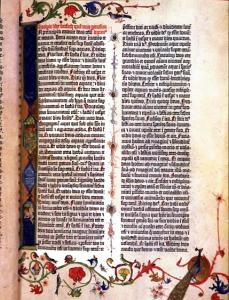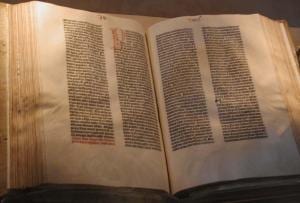 In two previous essays, I attempted to draw a sketch for how the Bible may have grown into its current shape, and how some readers over the centuries of its existence actually read it over nearly two millennia. Today, I want to examine, from my own limited perspective, how the Bible actually functions in the contested theologies of the year 2020. Let me say clearly up front that I think the Bible is for many readers a blunt instrument, used to assault those who dare to disagree that it must be read one way, as opposed to another. Of course, there is nothing especially novel about this way of employing the biblical text; for centuries disagreements about the Bible led to more than a few burnings and beheadings. During the reign of Henry VIII of England, in the 16thcentury, the king found a biblical verse that enabled him to divorce his first wife, Katherine of Spain, after 20 years of marriage, and marry Anne Boleyn, who became mother of Elizabeth I. However, Henry craved a son, and Katherine could not provide him with one. She had also been the wife of his brother who had died fairly young, making Henry king. Lev.18:16 offered to Henry a way out of his now quite loveless relationship, and at the same time suggested a reason why Katherine could not produce a male heir (she did birth a living daughter, Mary). Henry reasoned that because he had “uncovered the wife of his brother,” that is had had a sexual relationship with her, he had broken God’s strict command. He said he was cursed thereby never to have a male child with Katherine. Thomas More refused to accept the king’s break with Katherine, and subsequently with the pope in Rome, and went to the block on Tower Hill. Thus, a verse from Leviticus became the basis for the English Reformation, and the beginning of the Church of England, separated from the Roman church for all time.
In two previous essays, I attempted to draw a sketch for how the Bible may have grown into its current shape, and how some readers over the centuries of its existence actually read it over nearly two millennia. Today, I want to examine, from my own limited perspective, how the Bible actually functions in the contested theologies of the year 2020. Let me say clearly up front that I think the Bible is for many readers a blunt instrument, used to assault those who dare to disagree that it must be read one way, as opposed to another. Of course, there is nothing especially novel about this way of employing the biblical text; for centuries disagreements about the Bible led to more than a few burnings and beheadings. During the reign of Henry VIII of England, in the 16thcentury, the king found a biblical verse that enabled him to divorce his first wife, Katherine of Spain, after 20 years of marriage, and marry Anne Boleyn, who became mother of Elizabeth I. However, Henry craved a son, and Katherine could not provide him with one. She had also been the wife of his brother who had died fairly young, making Henry king. Lev.18:16 offered to Henry a way out of his now quite loveless relationship, and at the same time suggested a reason why Katherine could not produce a male heir (she did birth a living daughter, Mary). Henry reasoned that because he had “uncovered the wife of his brother,” that is had had a sexual relationship with her, he had broken God’s strict command. He said he was cursed thereby never to have a male child with Katherine. Thomas More refused to accept the king’s break with Katherine, and subsequently with the pope in Rome, and went to the block on Tower Hill. Thus, a verse from Leviticus became the basis for the English Reformation, and the beginning of the Church of England, separated from the Roman church for all time.
In our day, Leviticus has come up again with a vengeance. In that very same chapter 18, vs.22, the text says, “You shall not lie with a male as with a woman; it is an abomination.” That proscription is repeated with the addition of capital punishment for both males, in Lev.20:13. These two Levitical texts have been used now to claim that same sex relationships and certainly marriage between two persons of the same sex are sinful, because “the Bible tells us so.” My own denomination, United Methodism, remains deeply divided due to this reading of the Bible, some saying that the Bible forbids same sex relationships, and since that is the case, any who say differently obviously reject the authority of the Bible. Here is biblical warfare at its most formidable and sounds exactly like Henry’s biblical claims of nearly 500 years ago.
That example suggests one certain thing about the use of the Bible in our age: when certain texts support what we want them to support, then the Bible is our guide and stay. To be fair, I must say that this biblical “proof-texting,” that is finding various verses that buoy specific cultural and theological dicta, is hardly confined to fundamentalists or any other neo-conservative Bible readers. We “liberals,” or “progressives,” as I prefer to term us, are often just as guilty of proof-texting as our more conservative colleagues. Once again, there is a text from Leviticus that finds its way into our speech in 2020. In Lev.19, sandwiched in between the two demands about same sex relationships, we find, first, a famous phrase later quoted by Jesus as a summation of the whole law: “you shall love your neighbor as yourself” (Lev.19:18). And in that same chapter, Lev.19:34, we read: “you shall love the immigrant as yourself.” I have heard that quoted again and again, and have myself quoted it, as a biblical rationale for treating our immigrants far better than our current government is inclined to treat them. They are to be treated exactly as we treat citizens, as Lev.19:34 states with absolute clarity. So, what can possibly be wrong about hurling that verse, along with its Jesus-quoted parallel verse, in the face of those who would make the life of the immigrant miserable, rather than to accept that life with full openness and genuine love?
Here is the problem with hurling Bible verses in theological warfare, lobbing them across the battlefield with the hope of triumph over the foes: ripped from their priestly contexts, these verses, about same sex relations and about the care of immigrants, dangle freely in the air, like cherries ready for the picking. The entire book of Leviticus is a priestly closed system, attempting to make those who would follow its dicta holy, as fully like God’s holiness as can be imagined. And its fuller explication includes vast numbers of commands that we Bible quoters are less inclined to find amenable to our styles of living in 2020. What about the animal proscriptions of Lev.11, where we are told that the eating of all sorts of shellfish, “those things that live in the sea and have not fins or gills,” more specifically, are an “abomination,” the very word used to proscribe same sex attraction (Lev.11:9-12)? Or what about the clear demands for festival celebrations in Lev.23, including a “festival of the trumpets” to commemorate “a day of complete rest” (Lev.23:24-25)? And remember this amazing commandment in Lev.25 concerning the Jubilee Year: every fifty years it is commanded by the priestly book that all property will be returned to its rightful owner, no matter how many transactions have occurred in the interim. This is designed to prevent a few people from attaining vast tracts of land and tossing many into poverty and want. It was the ancient way to spread out the wealth of the community, to make equality of ownership a reality, to avoid the huge gulf between rich and poor. Why is that demand not hurled in the face of the wealthy who horde far more than their share of the earth’s goods to the detriment of the many poor? Why exactly is the call for economic jubilee not as significant as the rejection of same sex relationship or immigrant fair treatment?
The point is: the entire priestly world is of a piece; each of its elements is as significant as the other, and it is finally completely unfair and absurdly selective to grab a verse here and there and fire it at those who have other visions and goals and plans than our own. Are we progresssive Bible readers in 2020 no different than those fundamentalists who treat the Bible as a kind of collection of individual phrases, ready to be picked and quoted to win arguments? Is that finally all the Bible is? If so, why not employ the I Ching, that ancient Chinese system where certain adherents point randomly to a portion and determine that that will be the guide for the day? This is mere magic, a kind of numbers racket that is little better than astrology or palm reading.
I have tried to show with my two previous essays that the Bible we now read has come to us through a complex process of growth into the canon we now have, and has undergone wildly different ways of reading in the two millennia of its existence. Those who would employ the Bible “as the sufficient rule both of faith and of practice,” as one of the old church creeds has it, must know something of this complexity if they are to deal fairly and adequately with the living biblical text. There can finally be no place in discussions of the Bible for the throwing of this text against that one by way of a contest. It has been said that “one can prove anything by using the Bible,” and that statement is in part true if the way the Bible is used is as a collection of unconnected sentences and phrases. The Bible demands care, a deep knowledge of how it came to be, how it has been used, and how it may be read if it is to have any significance in our secular age. If anyone may use the Bible in anyway they choose, employing random quotations from this book or that, despite a complete lack of awareness of the issues I have tried to raise in these three essays, then the Bible will never be able to function as the life-giving, life- challenging document it has so often been found to be. Our Bible demands work and study to assess fairly its rich resources. I urge those of you who would use it for faith and practice to match your zeal for its sacred power with your zeal for a most serious engagement with its depths and its difficulties.
(Images from Wikimedia Commons)











